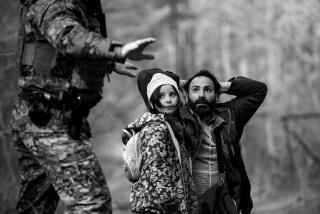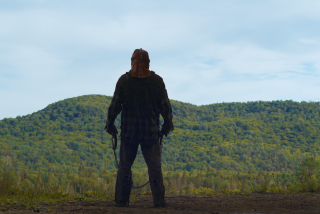A very long night in Bucharest
New York â CORINA SUTEU isnât happy to tell the true story behind âThe Death of Mr. Lazarescu,â the widely honored new Romanian film that traces the ill-fated journey of a paramedic and her patient. But Suteuâs voice stays focused as she describes what happened that night in Bucharest. âUnfortunately, I am obliged to tell you it is true,â she says. âBut it was a huge scandal.â
In 1997, it seems, a female paramedic took a 52-year-old man to one hospital, then a second, a third, five in all. At each, doctors ignored him, rejected him, forced them back to the ambulance. The paramedic finally left her tubercular passenger on a sidewalk, where he was found dead.
âThis film is one of a very negative aspect of life in Romania,â Suteu says amid an art opening at the government-sponsored Romanian Cultural Institute of New York, which she runs in Midtown Manhattan. âBut I think the making of such a film shows that, as a country, we are growing.â
It was a week before the film -- which follows the news story and doesnât -- had its commercial release in New York, two weeks before its arrival Friday in Los Angeles. Suteu had invited Cristi Puiu, the filmâs director, to attend the New York opening, but he declined, saying he was terrified of flying.
Critics have admired the film as a timely look at medical frustrations with which people everywhere can identify and as a Kafkaesque study of an individual bumping up against an indifferent bureaucratic system. But Suteu says she and other Romanians also take a more historical view. She said the filmâs success -- it won last yearâs Prix Un Certain Regard at Cannes and numerous other honors -- has come to symbolize for many the search for a new openness by the âin-between generationâ that came of age under the brutal Communist dictatorship of Nicolae Ceausescu and is trying to make sense of changes since the regime fell in 1989.
The 39-year-old filmmaker, speaking from Bucharest, describes a âa very, very intense love-hate relationshipâ with a Romania beset by corruption, âbureaucratic inertiaâ and a reluctance to face up to problems. He also says his film, shot over 39 nights in real hospitals, is fiction intended as âa universal expression of the human condition.â
Made for the equivalent of about $500,000 and shot in a series of gray-lighted interiors that trap the viewer in this patientâs fate, the film owes a lot to Frederick Wisemanâs unsparing documentaries and to Tolstoyâs novella âThe Death of Ivan Ilyich.â Puiu (pronounced POU-you) says he spent years eavesdropping on doctors as the son of a hospital administrator and that he also drew on his own unhappy encounters with Romanian healthcare.
When we drop into the world of Dante Remus Lazarescu, a 62-year-old retired engineer, he is sitting in his kitchen, unshaven and wearing a knit cap and calling for an ambulance. His tone is matter-of-factly determined (Puiu recalls repeatedly telling actor Ion Fiscuteanu: âDo not play the victimâ), but help isnât coming.
Puiuâs long opening sequence is either one of the boldest beginnings of any recent film or tedious folly, as a shoulder-held camera closely pursues Lazarescu while he drinks rotgut from an unlabeled bottle, rummages in a cabinet for some Pepto-Bismol-like goo, strokes one of his three cats, takes and coughs up aspirin, glances at the TV. Thereâs news of the bus accident that will overwhelm city hospitals with casualties and become one cause for Lazarescuâs deferred treatment. He crosses the hall to ask neighbors for pills.
Heâs a widower who drinks quite a bit. His wife has died. His daughter has moved to Toronto. Heâs been throwing up all day. He has piercing headaches. He rests on a sofa, closes his eyes, then vomits blood and waits until a barely sympathetic paramedic arrives. Another long sequence unfolds and she finally takes him to the ambulance and their journey begins.
âIt is 55 minutes until heâs at the ambulance,â Puiu declares, laughing, with defiant-sounding pleasure at locking viewers into blackly comic near-stasis. A devil-may-care drive to face âlife as it really happensâ is his artistic creed. The 85 pages of that sequence are his work, he says with a glow, while co-writer Razvan Radulescu focused on the rest of the script.
âPeople say it is the length that bothers them, but it is not the length. We donât want to watch an old man, walking around with his cats, sick. I have a problem with it myself. I am not Mother Teresa. I hate death. I hate degradation and disappearance and all that is related to old age and loneliness. This film is 100% my own confession about my fears. Death: I can not digest this. I am like a kid going to the zoo to see the giraffe. It is like something on another planet. I am amazed by it.â
*
A directorâs influences
BORN in Bucharest, Puiu studied painting but discovered film âas a possibilityâ when he saw Jim Jarmuschâs âStranger Than Paradiseâ and refined his stylistic ideal when he found the films of John Cassavetes. He credits his mixture of detachment and passion about Romania to having studied abroad, in Geneva, Switzerland, for a year. A thesis he wrote there, which he says still guides him, was titled âNotes on a Poetic Realistic Cinema.â
âLazarescuâ is his second feature. His first, âStuff & Dough,â won several prizes at festivals. A short, with the Jarmusch-like title âCigarettes & Coffeeâ (2004), won the Golden Bear for best short at the Berlin Film Festival. Puiu has also written for newspapers about Romanian film and the film establishment, often âhighly criticalâ pieces he says prompted the state film council to deny him funding for Lazarescu.
Puiu made a direct appeal to the minister of culture, Razvan Theodorescu, who broke the impasse.
When he speaks, he can go on at length, glimpsing the mental star of a new idea and heading toward it with surprising connections across the realms of film, literature, politics, social criticism and music.
âThe real story [of the paramedic and the man] was a starting point for building up a story, following the model of the music of Philip Glass.â
Philip Glass?
âYes, for inducing a different way of telling an absurd story, because I am very much attached to the music of Philip Glass and the philosophy of Philip Glass, repeating, repeating, repeating. I think that this is life, that we are making on and on the same mistakes. People do not learn. They do not assume their responsibilities.â
Romaniansâ social irresponsibility toward other Romanians is a big Puiu theme. But he discounts what he calls âspectacular accidentsâ of irresponsibility, focusing on the ongoing sense of violation that he says spoils daily life. âThe real case of the paramedic who left this patient in the street was not a normal situation. In normal life, these things are happening all the time without a dead body at the end.
âIt was a story in Bucharest that a man was trying to pay his taxes in a very long queue, and this man died there because of heart failure, because of the heat, because of the fatigue; this was an accident. The normal situation is that you have to wait and to confront the offices of these bureaucrats, and you cannot escape the lack of respect, indifference, arrogance all over. You donât die, your life goes on, and then it happens again.â
*
The filmâs conscience
IN the film, Lazarescu does not end up abandoned on the sidewalk. It is even ambiguous whether he dies at the end from bleeding near his brain or whether he will die later, of liver cancer. What most fully distinguishes the story from the scandal is how Puiu turned the paramedic into the sympathetic counterpoint to the others they meet. Puiu says she is not as sympathetic a character as many perceive -- â50-50 sympatheticâ he says. Mioara Avram (played by Luminita Gheorghiu) is the filmâs conscience. She sticks by Lazarescu, hospital to hospital, speaking up and even arguing for him with doctors.
The real paramedic was a young woman, and she was put in jail. âShe got the blame, and the doctors got to keep doing their jobs nice and clean. They were all to blame! The whole system is to blame!â
The film peels back layers of behavior among doctors and nurses, as we witness one doctorâs bias against Lazarescuâs drinking, the political savvy of a nurse who flirts to enlist another doctorâs help, and the importance of Avramâs connections among hospital workers in getting Lazarescu a CAT scan. Puiu, who limited his patientâs tour to four hospitals, said some viewers in Romania accused him of âgoing too easyâ on the real world of Romanian medicine.
Yet he says that, angry as the real orphan-patient scandal made him, he stayed carefully nonjudgmental toward the doctors in his film. He spoke of his general respect for doctors, for âa profession that deals with something I do not deal with, people who face death every day. I do not mean to only criticize. I want to say, âThis is how it is. This is what happens. Some are good. Some are bad.â â
And people will be surprised to learn that he made the film as a study of love. In fact, âThe Death of Mr. Lazarescuâ is the first of a projected six-film cycle of love stories: Love between a man and a woman, love for oneâs children, love of success, love between friends, and carnal love. Lazarescuâs story represents love for oneâs neighbor, shown often by its absence.
Puiu says the seriesâ cumulative title -- âSix Stories From the Bucharest Suburbsâ -- pays homage to the âSix Moral Talesâ of Eric Rohmer.
There are other rising Romanian filmmakers, Christian Mungiu and a Jewish Romanian named Radu Mihaileanu among them.
Still, Suteu says, Puiu has come to stand out. Peter Rado, a Romanian American writer on film and culture who lives in New York, speaks of the unusual degree to which Puiu has been able to sensitize audiences to a reality that is inescapably Romanian yet broadly human. He credits contributions by Lucian Pintilie and the few other Romanians whose films have gotten foreign attention over the years but says Puiuâs work âis something new for us.â
Romanians, Rado says, have long hoped for a figure on par with Italyâs Fellini or Vittorio De Sica or the great French film artists. He believes Puiu shows a potential to step into that role. âBut one can also collapse under such ambitions,â he says. âI am also nervous. One can expect too much.â
âI am also nervous,â says Puiu. âBut this is the way it is. I plan to make these five films. Is it so ambitious? I suppose so. But these are low-budget films. My whole thinking is always how to make the most with modest means. Life is long. You have to make your films. And you have to take prizes and fame as a side effect. You do not make out of this a goal. It is most important to confess, to tell the truth.
âWe are far from one another,â he says, across the long-distance connection. âWe donât know each other and I can afford to be myself, which is what I am trying to do when I am making films.â
More to Read
Only good movies
Get the Indie Focus newsletter, Mark Olsen's weekly guide to the world of cinema.
You may occasionally receive promotional content from the Los Angeles Times.










